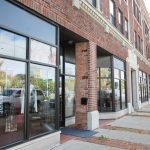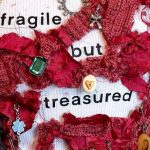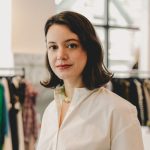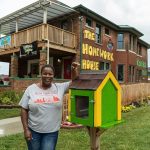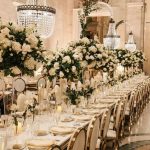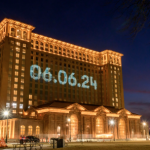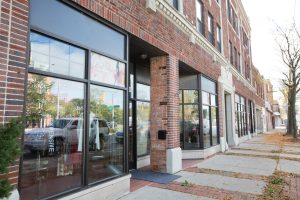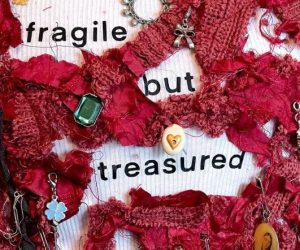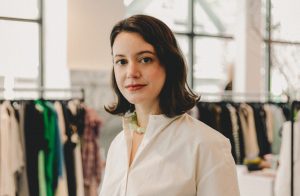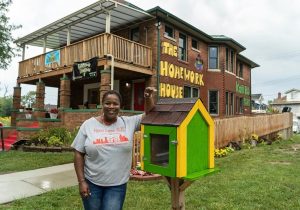Welcome to a new episode of Detroit Is THIS, a podcast hosted by Ivana Kalafatic, founder of Detroitisit. The show follows thought leaders, community change agents, makers, innovators, and entrepreneurs as they share their personal and professional stories.
Through these conversations, we’ll explore opportunities and solutions for the new times we find ourselves in.
In Episode 7, Detroitisit speaks with Roslyn Karamoko, CEO of Détroit Is The New Black, who shares her journey to Detroit, background on emerging into the fashion industry, navigating COVID-19 as a small business owner and the future of retail.
Roslyn Karamoko is the CEO and founder of Détroit Is The New Black, a brand that exists to highlight the culture and community of Detroit. Détroit Is The New Black not only successfully provides quality clothes, but the space also hosts private and public events and the brand facilitates community conversations. The brand is more than fashion—it’s an experience that unites fashion with art in one space and ultimately serves the community. As a local designer, Roslyn offers practical advice to other bricks-and-mortar operations as they navigate the effects of COVID-19.
When Roslyn moved to Detroit in 2013, it was the city’s creative community and overall process of rebuilding that would bring the concept of Détroit Is The New Black to life, she speaks on how she has been forced to pivot as a business owner and shares insight and advice to other small business owners navigating these unprecedented times.
KEY TAKEAWAYS
- The most interesting part about fashion is the perspective it represents.
- Go back to the core. Peel back the layers and remember your mission.
- Evaluate your mission. Was that the right way to go?
- Get out of your own way. Ask yourself, “What do I want to focus on?”
TELL US WHAT BROUGHT YOU TO DETROIT AND YOUR JOURNEY TO GET HERE?
Yes, so I’m not a Detroit native. I’m actually from Seattle, Washington originally, but I got to Detroit in 2013. I came here because of a boy. I followed a boy here. My ex-husband is from here and that’s how I got here. We split, but I loved it. I fell in love with Detroit and I think that was just the vehicle to get me here. I just decided to stay, I thought there was so much work to be done and, you know, such an interesting mix of people and energies. And I just wanted to be here, so I stayed. Again, I’m originally from Seattle but kind of lived all over and seen a lot of the world and of life. A lot of the world and of life, so it’s just beautiful to bring all of it back to Detroit.
WHAT WERE SOME OF THE BIG DIFFERENCES BETWEEN SEATTLE AND DETROIT WHEN YOU FIRST CAME HERE?
There are more black people here. More diverse, you know. After Seattle, I went to Howard, so I moved to DC. I lived in DC for four years, and then I lived in New York for five years for work. I lived abroad in Singapore for a year. So I’m kind of a nomad, you know, so all of those places are very different, but all interesting. And I just love people. I love culture. I love to see different kinds of locations and demographics, and what people are doing.
WERE YOU IN FASHION IN THE CITIES YOU LIVED IN? WHAT TOOK YOU INTO FASHION?
No, that’s what it always was. I majored in fashion merchandising at Howard. And then in New York, I was working in the buying office for Saks Fifth Avenue. And then in Singapore, I worked as a global buyer or retail consultant for an e-commerce startup that was starting in the Southeast. So always in the buying and the merchandising space.
I was a weird kid, I liked eclectic style and so it [fashion] was a way for me to express myself, it was a way for me to connect, with different creatives or different things that I was, I was drawn to. I just loved expression. I remember being six years old and wanting these jeans so bad because salt and pepper had them. I was like mom, I need these jeans and I was six. Something about the fashion, something about wearing them, it felt so free and it felt so fun. I just wanted to be a part of it. So that’s how fashion started for me. I never was really like a designer, so I don’t sew, I don’t draw. I have an eye for it. I would have like an idea, you know, and my mom would sew it for me if I couldn’t, or I would just find, you know, someone to execute it. I just love people and I love to see how people express themselves through clothing.
I always say for my second career or my second life, I’m going to go back to school for psychology because I think it’s cerebral. The way that we dress and what is trending, it’s really on the back of societal change or political change or something else that’s happening environmentally. That’s interesting to me, how are people speaking, how are they showing up, and what are they wearing to represent what that moment is in society. It’s like fashion, I’m over it., I hate to say that, but now I’m kind of past the clothing. It’s more about, “that’s an interesting perspective.” If I see a new designer or something, I’m like, that’s a really interesting perspective. And that’s what I appreciate about the industry.
HOW IS FASHION A FIRST FORM OF COMMUNICATION TODAY?
What was so interesting is I look at pictures from now, from the recent protests, not even millennials, Gen Z, or whatever the generation is…if you take a snapshot of what they look like, and look at pictures from the ’60s, from Woodstock, from Civil Rights movement, I mean, the fashion is so similar and the expression is the same. There’s something really hippy, very, almost run and kind of counter-culture, about what the fashion is, what the style is. Fashion is evolutionary, right; not revolutionary. We’ve seen it before in some form or fashion. So we’re having a similar moment in the world. We’re seeing that show up in fashion. That’s how I think about predicting fashion trends or fashion. Where’s the world going? Well, where will we be in 2021? What will our political landscape look like? Well, all of those things are going to factor into how and why we purchased.
HOW DO YOU PREDICT FASHION?
For suits, it’s almost a commentary around masculinity and how society is now more accepting of more fitted styles on men or it’s more acceptable for a man to appreciate fashion or to take concern over what he’s wearing. Whereas in early 2000s or late 90s, men wearing suits was metro-sexual. Now society’s evolved, so you see masculine men or traditionally masculine men comfortable in pinks and in color or feminine fits. So I think it’s a common commentary around gender and sexuality, all of that too.
HOW DO YOU MAKE A SPACE STAND OUT AND MAKE IT ENOUGH PEOPLE LIKE IT, SO IT BECOMES MEANINGFUL AND ADOPTABLE?
That’s a really interesting point, in terms of really representing the times. Artists’ jobs are to reflect the times in their work and what’s happening and not to necessarily be on-trend, but to have a voice and to say something different. I think for brands, it’s this weird balance of being different and saying different things and standing out. It’s also being comfortable enough for the mass market to receive it or for customers to understand it. So it’s trying to find this balance of being different and having a strong narrative, but also being approachable. Being accessible to your customer – this is why sometimes it’s rare to see brands that last a long time outside of the more established houses. I mean, there are a lot of brands that are here for a minute because they speak to that time and they email in a lot of ways. My hope is that Détroit is the New Black is for Detroit. I don’t know that it will last forever, but I know that right now it’s an important conversation to have. I think it can make real change in what’s happening in the city.
WHAT WAS THE PROCESS OF GETTING BRANDS INTO YOUR STORE AND INTRODUCING THEM TO DETROIT?
When I opened, I wanted to bring high-end into Detroit and I wanted to bring some culturally relevant and diverse designers to Détroit Is The New Black. I was able to do that and I’m grateful for that. Negotiating with them and asking them to come–it’s a little bit of work and to tell them why it’s a great opportunity and how they’re trailblazing and bring designers back to the city. But you know, it’s also a balance with the current state of the economy in Detroit and just the market itself. Can the market support, you know, these price points? Is it a viable business?
And I don’t think that’s a unique challenge to me or to Detroit. I think that’s across the board in this sort of, entry to designer category in fashion. It’s just a tough business. We tried it. I believe Detroit is beautiful and I wanted to bring beautiful things to Detroit, but I also think there are a lot of beautiful local designers and products that can be curated, amongst these national designers and in this higher-end space, and that’s really what the space is about: how do we showcase the best that Detroit has to offer? How do you merchandise that? How do you merchandise that on a level that’s not competitive, but comparable to other cities? I’ve seen a lot of stores, I think my store is okay, I think it’s exciting to look at Detroit and to see Detroit product.
WHAT IS THE FUTURE OF RETAIL?
It’s a scary question because I don’t know what the future of retail is. I came in five years ago. I’m going to do this brick and mortar store; before this, I worked for Saks. So I know how this works now, but those corporate giants are going down. So I’m like, okay, what am I building here? I think it’s the opportunity to grow with the city and navigate what is the future of retail and what do brick and mortar spaces look like? What’s the best use of those spaces? How do you use that as marketing to leverage your online business into a growth online narrative? So that’s really what our focus is.
WHAT HAS IT BEEN LIKE DEALING WITH THE COVID-19 SHUTDOWN?
It’s a nightmare. I mean, it’s a complete nightmare, but I think it’s forced Détroit Is The New Black to pivot in a way that we should have done a long time ago. Thinking about focusing online as opposed to it being an afterthought, because we’ve been so active locally in the store. How do we start to create that experience online? We have some really exciting partnerships coming up and one of them is with Boys and Girls Club. They’ve partnered with Pony Ride, which is a co-working space here in Detroit, but essentially we’re building an online marketplace for these Pony Ride alum. Some of them are good businesses and there are a lot of product-based businesses in Detroit and people who come to our site, that are looking for the best of Detroit or the best product, that the local sort of community has to offer. For us to be able to aggregate that and create an elevated experience, a well-merchandised assortment online, I think, is an exciting initiative for us. It’s allowing us to share our following and our visibility with rest of the Detroit community. It’s a journey, definitely all evolving and all learning for me, but, going back into a physical space, post-COVID, that’s real.
WHAT WAS HAPPENING WITH DETROIT IS THE NEW BLACK DURING THE PROTESTS IN DETROIT?
The store was boarded up, but no one broke the windows. It was funny–well, not funny–but there was a decal on our window, which was just a decoration that was there and so once the windows were boarded, from the distance it looked like the window was fully broken out. No one broke our window. It was a conversation around local versus national retail and what retailers are being boarded up or who’s getting the proper attention.
Woodward Avenue, it’s a political street. It’s not just about walking into a store down there, and I think in some way, I’ve been able to use my fashion background or my merchandising background to have more political conversations and have a larger sort of investment in the future of equality in the city, diversity in the city, who’s at the table, who has access to what resources. That’s really what the brand is about. Through that online debacle with the boarding up situation, that’s what it was about. I’m not a super public influencer or a person that you see all the time.
WHAT ARE THREE TIPS TO NAVIGATE THE CURRENT CLIMATE? HOW DO YOU SUCCEED AS A SMALL BUSINESS?
First tip, I would say, go back to the core, go back t, how you started. Go back to your mission, the intention behind it, and what’s working. Just really peel it back to its core layer and start there. I think you can start a business and it can grow and evolve, and sometimes you can look up and just be like, “what am I?” I think just really taking a step back and having that downtime through quarantine to just reevaluate everything helps.
I would also say evaluate your mission, because maybe your core mission, wasn’t the right thing for your business. Just evaluate your contribution to the world and how is it hitting people. Someone told me this a long time ago, but it’s just stuck with me. I had this idea for a brand and all this stuff. He was a pretty successful entrepreneur and he’s just, he just asked me, he said, “but how does it serve people?” How does it help people? I think when you look at something from a problem solver mindset, you don’t have to throw a ton of marketing at it or you’re not hard selling people. It just makes them want to participate. They just want to use it. They want to buy it and want to be a part because it just makes sense for their life. And so I think that can be the hardest thing for strong-minded strong-willed entrepreneurs who have the next best idea.
The third thing is getting out of your own way and just recognizing where am I best utilized within the company? It’s hard sometimes to let go and to grow and let work autonomously execute itself. So I think just taking a step back and asking yourself, what do I want to focus on? How do I want to grow the organization? And what can I literally handoff and be okay with? So, it’s about looking at your core competencies and understanding how you can serve.
CONNECT:
ADDRESS: 1430 Woodward Avenue
WEBSITE: Detroitisthenewblack.com
EMAIL: info@Detroitisthenewblack.com
INSTAGRAM: @Detroitisthenewblack
Tune in now and subscribe to Detroit Is THIS where you normally would listen to all your podcasts to learn more about Detroit’s thought leaders, innovators, and entrepreneurs!
Follow us and discover more of our podcasts on:
Facebook https://www.facebook.com/detroitisit/
Twitter @Detroitisit
Instagram @detroitisit
LinkedIn https://www.linkedin.com/company/detroitisit
Apple podcasts @DetroitisitThis
Spotify @DetroitisThis






